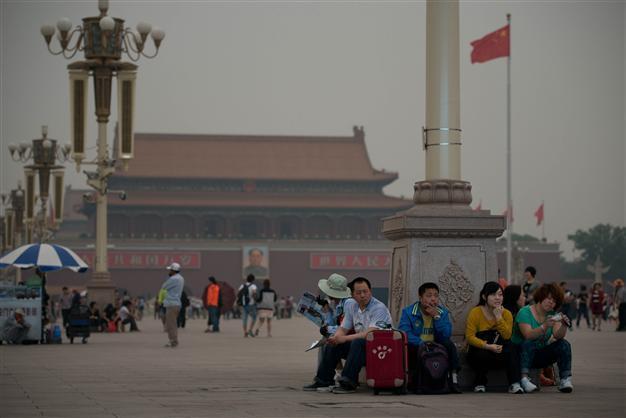China blocks Tiananmen anniversary remembrance
BEIJING - Agence France-Presse

People rest against a lamp post on Tiananmen square in Beijing on June 4, 2013. Authorities launch a major push every June 4 to prevent discussion of the violently crushed 1989 pro-democracy protests, in which at least hundreds of people died. AFP photo
Chinese police blocked the gate of a cemetery holding the remains of victims of the Tiananmen crackdown on its 24th anniversary Tuesday, ahead of a vigil expected to see 150,000 people gather in Hong Kong.Authorities launch a major push every June 4 to prevent discussion of the violently crushed 1989 pro-democracy protests, China's most widely condemned human rights stain in recent decades, in which at least hundreds of people died.
Hong Kong and Macau both enjoy special privileges and are the only two cities in China where open commemorations are possible, and the large candlelit vigil in the former British colony is a rallying point for critics of Beijing's influence.
In Beijing, more than a dozen security officials were deployed outside the stone gate at the Wanan graveyard in the city's west which members of the Tiananmen Mothers, a victims' relatives group, visit each year.
English-speaking police officers barred entry to AFP, demanding to see identification and telling a videographer to stop filming.
In a narrow street close to Beijing's Forbidden City, security personnel patrolled outside the former house of Zhao Ziyang, the former communist party secretary who was purged and held under house arrest following the protests.
Individuals in civilian clothes sought to block AFP filming in the area, as a petitioner was taken away.
Several police vehicles were positioned on Tiananmen Square itself, a vast concrete plaza in the centre of the capital, where huge video screens celebrated "Green Beijing" with images of a spinning wind turbine.
Hundreds of mostly Chinese tourists strolled, posing with national flags and snapping pictures on smartphones. Some had their identification cards checked by police.
The uniformed police numbers were no higher than usual, said a snack vendor who asked not to be named. But he added: "Most police are plain clothes, you don't know when they might be listening." The Tiananmen protests were the Chinese Communist Party's greatest crisis since it came to power in 1949.
Deng Xiaoping justified the military intervention -- which saw more than 200,000 troops deployed -- as being against a "counter-revolutionary rebellion", but discussion of the incident has been so widely suppressed that most young Chinese are barely aware of it.
Beijing has never provided an official toll for the repression, which was condemned throughout the world and led to its temporary isolation on the international stage.
Unofficial estimates of the numbers killed range from around 200 to more than 3,000. The Tiananmen Mothers said in an open letter last week that they believed the higher figure was accurate.
At the time, Chinese authorities spoke of 241 dead -- including soldiers -- and 7,000 wounded. Independent observers tallied more than 1,000 dead in Beijing, without including victims elsewhere.
Seas of people were expected to flood into Hong Kong's Victoria Park Tuesday for an annual vigil which is also a forum for protest over Chinese interference in the city's affairs, amid fears it could lose freedoms not enjoyed on the mainland.
Organisers said they expected 150,000 people to attend.
"I think all of us, even the new generation in Hong Kong, would have the same feeling that it is a tragedy and also an offence of the government to shoot people like that," said Richard Choi, vice chairman of the Hong Kong Alliance in Support of Patriotic Democratic Movements of China.
On the mainland, authorities detained or enhanced surveillance surrounding at least 10 prominent dissidents, according to the Hong Kong-based advocacy group China Human Rights Defenders.
Online searches for a wide range of keywords on Sina Weibo, China's version of Twitter, were blocked, from "Tiananmen" to "candle", which was used to encourage digital vigils.
Activists turned instead to overseas websites to commemorate the event and criticise authorities.
"The dispute in this country is basically stuck on whether to light a candle or to extinguish it," dissident artist Ai Weiwei posted on Twitter.
Rights lawyer Liu Xiaoyuan said on Twitter that he had been blocked from Sina Weibo for seven days for sharing "sensitive information" -- urging others to honour victims by posting an image of a lit candle.
A mocked-up imitation circulated online of the 1989 "Tank Man" photograph of a civilian staring down a long row of military vehicles, with the military vehicles replaced by plastic ducks, a likely reference to a popular giant artwork on show in Hong Kong.
The image could not be found on domestic websites within the "Great Firewall of China", as the country's system of Internet controls is known.
















